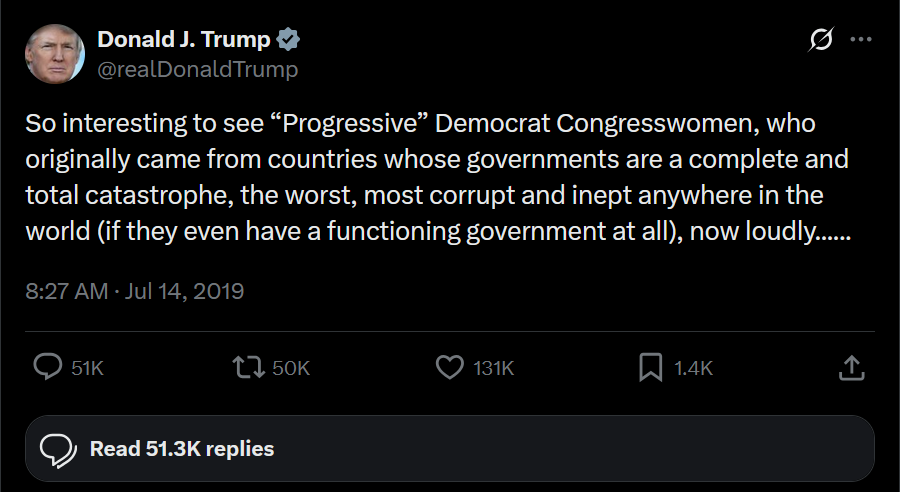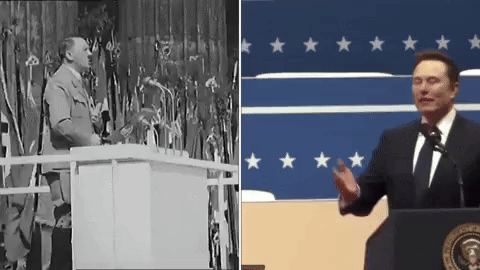Robert O. Paxton
Source: The Anatomy of Fascism
Fascism may be defined as a form of political behavior marked by obsessive preoccupation with community decline, humiliation, or victimhood and by compensatory cults of unity, energy, and purity, in which a mass-based party of committed nationalist militants, working in uneasy but effective collaboration with traditional elites, abandons democratic liberties and pursues with redemptive violence and without ethical or legal restraints goals of internal cleansing and external expansion.
Hannah Arendt
Source: The Origins of Totalitarianism
Totalitarian movements depend on the sheer force of numbers to such an extent that totalitarian regimes seem impossible, even under otherwise favorable circumstances, in countries with relatively small populations. Even Mussolini, who was so fond of the term "totalitarian state," did not attempt to establish a full-fledged totalitarian regime and contented himself with dictatorship and one-party rule... Intellectual, spiritual, and artistic initiative is as dangerous to totalitarianism as the gangster initiative of the mob, and both are more dangerous than mere political opposition. The consistent persecution of every higher form of intellectual activity by the new mass leaders springs from more than their natural resentment against everything they cannot understand. Total domination does not allow for free initiative in any field of life, for any activity that is not entirely predictable. Totalitarianism in power invariably replaces all first-rate talents, regardless of their sympathies, with those crackpots and fools whose lack of intelligence and creativity is still the best guarantee of their loyalty.
Walter Benjamin
Source: The Work of Art in the Age of Its Mechanical Reproduction
The rise of fascism is often precipitated by a breakdown of social order, where the state’s institutions are unable to provide protection or stability, leading individuals to embrace strongman rule... Language, under fascism, becomes a tool for exclusion; it is used not just to persuade but to divide, to create 'us' and 'them' and to demonize those who don't conform to the official narrative... Fascists use the media to create an illusion of popular consensus, making dissent seem like an aberration, and framing the leader as the embodiment of the people's will... Isolation makes people vulnerable to the simplistic and divisive messages of fascism, which offers clear answers to complex problems by creating scapegoats for society’s ills... Fascism arises out of a situation where the ruling class has lost its power to govern, but is still determined to maintain its privilege.
Roger Griffin
Source: The Nature of Fascism
Fascist ideology often relied on the myth of national greatness, invoking past moments of glory and projecting them into the future. The fascist movement promised a return to a time when the nation was strong, unified, and respected on the global stage. This appeal to past greatness was combined with the notion of national revival, a rebirth that would restore the nation to its rightful place as a dominant power. For many, this vision of a future national resurgence was deeply compelling, offering hope for a better future in the face of ongoing social and economic crises... The idea of the nation as a unified, homogeneous entity was essential to the fascist worldview, and this nationalism often manifested itself in the form of a radical, exclusionary identity. Fascist movements emphasized the need to purge the nation of foreign influences, including immigrants, political enemies, and anyone deemed to be a threat to national purity. This radical nationalism was often accompanied by a myth of national rebirth, a vision of a future in which the nation would be restored to its former glory, free from internal and external enemies.
Fritz Stern
Source: The Politics of Cultural Despair
Fascism is not merely a political movement; it is a totalitarian force that seeks to remake not just the state but the soul of the individual. It appeals to the deepest fears and fantasies of the people, replacing reason with emotion, myth with reality, and individuality with collective identity. Rooted in deep fears, uncertainties, and the desire for a new social and cultural order, fascism promises to restore lost honor, national unity, and a sense of greatness. The fascist state demands total loyalty, subordinating individual will to the collective, and is marked by a militaristic cult of strength, discipline, and unquestioning obedience. There is no room for dissent, and opposition is swiftly crushed in the name of national unity and purity. Fascism draws its strength from the resentment of disillusioned masses who, feeling betrayed by modernity, seek a return to a past they believe was full of greatness, stability, and order. In this state of mind, it is only a small step to the dehumanization of Jews and other minorities, who become convenient scapegoats for the nation’s ills. The breakdown of traditional values, the disintegration of old certainties, and the frustration of deep-seated hopes create fertile ground for ideologies that promise national renewal, pride, and strength.
Chris Hedges
Source: American Fascists: The Christian Right and the War on America
Fascism is a far-right, authoritarian political ideology that is characterized by a "dictatorial power," "forcible suppression of opposition," and "strong regimentation of society and the economy." It involves "a belief in the supremacy of one national or ethnic group," often tied to "intense nationalism" and a desire for "the restoration of national greatness" or the "purification of society." Fascism typically rejects "democracy" in favor of "an authoritarian government" and advocates for "militarism" and the "promotion of violence." It thrives in "situations of social and economic unrest," often capitalizing on "fear" and "dislocation" and seeks to create an "idealized past" that can be "restored" through a "charismatic leader" or "strong centralized leadership." Fascist movements are also noted for "scapegoating" marginalized groups and for believing in "racial purity" and the idea that certain people are "morally and socially inferior." It emphasizes the importance of "total control over society" and rejects "individual responsibility" in favor of "corporate power and unity." Fascism often exploits "anxiety" and "discontent" to consolidate power and control over the masses.
Jason Stanley
Source: How Fascism Works
Fascism weaves a myth of a distinction between 'us' and 'them,' rooted in a romanticized fictional past, supported by resentment for a corrupt elite, and upheld by a hierarchical vision of society where institutions operate under authoritarian principles. It traffics in delusions that simplify human existence, create false dichotomies, and exploit fear, insecurity, and economic inequality, offering the illusion of dignity and order while eroding democratic norms and liberties.
James Q. Whitman
Source: Hitler's American Model
Fascism is a far-right, authoritarian nationalist ideology that seeks to create a unified, hierarchical state organized around notions of racial purity, cultural superiority, and an idealized national identity. It uses propaganda, legal systems, and historical narratives to legitimize its actions and enforce its vision of a homogenous society. At its core, fascism operates as a revolutionary force, framing itself as a necessary and historic breakthrough meant to correct perceived societal flaws. It is characterized by: 1. Racist Ideology and Hierarchies: Fascism often amplifies existing racial ideologies, codifying explicit systems of exclusion and segregation. It draws inspiration from precedents in other nations, such as the United States' historical racial policies, and adapts them to create a more overt and radical framework that enforces racial and social hierarchies. 2. Manipulation of Legal Systems: Fascist movements leverage legal frameworks to institutionalize their ideologies, crafting laws that reflect their vision of racial and cultural superiority. By portraying these laws as rooted in tradition, necessity, and historical precedent, fascism creates a facade of legitimacy while justifying authoritarian practices. 3. Revolutionary Rhetoric: Fascism frames itself as the harbinger of a radical transformation, often described as a "national revolution." This language emphasizes a break from the past, presenting fascist policies as the inevitable evolution toward a utopian vision of the nation-state. 4. National and Historical Narratives: Fascist propaganda constructs a unified national identity centered on racial or cultural purity. It often positions itself as fulfilling a "historic mission" or destiny, invoking the idea of being on the "right side of history" to justify its actions and rally supporters. 5. Selective Borrowing and Innovation: While drawing from existing ideologies and legal precedents, fascism emphasizes its originality and superiority. It rejects mimicry, instead portraying its policies as unique, authentic, and more honest or direct compared to other systems. 6. Use of Propaganda: Language and propaganda play central roles in shaping public perception, fostering a sense of inevitability, and rallying support. Fascism constructs a narrative of progress, suggesting that it is part of a global or historical movement toward a "better future." 7. Authoritarian Control: Fascism seeks to dominate all aspects of life, including the political, legal, cultural, and economic realms, in service of its vision. This control is justified through appeals to historical trends, national destiny, and revolutionary necessity.
Michael Parenti
Source: Blackshirts & Reds
Fascist ideologies often exploit idealistic and inflated imaginations, offering a distorted vision of society where problems are framed as external threats (often racial, national, or ideological) that need to be combated. They simplify complex issues and offer straightforward, authoritarian solutions.
Madeline Albright
Source: Fascism: A Warning
Fascism can be defined as the relentless pursuit of political victory at any cost, driven by a warped concept of national greatness that benefits only a select few. In order to accumulate power, it often operates incrementally, making subtle, gradual changes that go unnoticed, much like "plucking a chicken—feather by feather" to avoid backlash. The signs of fascism’s rise are often disguised, appearing as constitutional reforms, security measures, or national virtues, even as they mask the oppression of certain groups and the erosion of freedoms. Once in control, dictators manipulate legal systems to consolidate power, leaving no legal recourse for opposition, while undermining the ability of a free society to correct its course through open debate and elections.
Clara Zetkin
Source: The Struggle Against Fascism
Fascism is the concentrated expression of the general offensive undertaken by the world bourgeoisie against the proletariat, aiming to perpetuate capitalist exploitation by forcibly crushing the working class, annihilating its political organizations, and destroying the very foundations of democracy. It is a reactionary, terroristic dictatorship of the most chauvinistic and imperialist elements of finance capital, utilizing deceit, violence, and propaganda to suppress social movements and preserve capitalist rule.
Timothy Snyder
Source: On Tyranny
The danger we now face is of a passage from the politics of inevitability to the politics of eternity, from a naive and flawed sort of democratic republic to a confused and cynical sort of fascist oligarchy... In the politics of eternity, the seduction by a mythicized past prevents us from thinking about possible futures. The habit of dwelling on victimhood dulls the impulse of self-correction. Since the nation is defined by its inherent virtue rather than by its future potential, politics becomes a discussion of good and evil rather than a discussion of possible solutions to real problems.
Umberto Eco
Source: Ur-Fascism
1. The cult of tradition. “One has only to look at the syllabus of every fascist movement to find the major traditionalist thinkers. The Nazi gnosis was nourished by traditionalist, syncretistic, occult elements.” 2. The rejection of modernism. “The Enlightenment, the Age of Reason, is seen as the beginning of modern depravity. In this sense Ur-Fascism can be defined as irrationalism.” 3. The cult of action for action’s sake. “Action being beautiful in itself, it must be taken before, or without, any previous reflection. Thinking is a form of emasculation.” 4. Disagreement is treason. “The critical spirit makes distinctions, and to distinguish is a sign of modernism. In modern culture the scientific community praises disagreement as a way to improve knowledge.” 5. Fear of difference. “The first appeal of a fascist or prematurely fascist movement is an appeal against the intruders. Thus Ur-Fascism is racist by definition.” 6. Appeal to social frustration. “One of the most typical features of the historical fascism was the appeal to a frustrated middle class, a class suffering from an economic crisis or feelings of political humiliation, and frightened by the pressure of lower social groups.” 7. The obsession with a plot. “The followers must feel besieged. The easiest way to solve the plot is the appeal to xenophobia.” 8. The humiliation by the wealth and force of their enemies. “By a continuous shifting of rhetorical focus, the enemies are at the same time too strong and too weak.” 9. Pacifism is trafficking with the enemy. “For Ur-Fascism there is no struggle for life but, rather, life is lived for struggle.” 10. Contempt for the weak. “Elitism is a typical aspect of any reactionary ideology.” 11. Everybody is educated to become a hero. “In Ur-Fascist ideology, heroism is the norm. This cult of heroism is strictly linked with the cult of death.” 12. Machismo and weaponry. “Machismo implies both disdain for women and intolerance and condemnation of nonstandard sexual habits, from chastity to homosexuality.” 13. Selective populism. “There is in our future a TV or Internet populism, in which the emotional response of a selected group of citizens can be presented and accepted as the Voice of the People.” 14. Ur-Fascism speaks Newspeak. “All the Nazi or Fascist schoolbooks made use of an impoverished vocabulary, and an elementary syntax, in order to limit the instruments for complex and critical reasoning.”
Stanley G. Payne
Source: A History Of Fascism 1914 - 1945
Fascism is described as: "A form of revolutionary ultranationalism for national rebirth, based on a primarily vitalist philosophy, structured around extreme elitism, mass mobilization, and the Führerprinzip (leader principle). It positively values violence both as an end and as a means, and tends to normalize war and/or military virtues."
Matthew N. Lyons
Source: What is Fascism?
Fascism is an extreme right-wing ideology that places the nation or race as an organic community above all other loyalties. It is grounded in the myth of national or racial rebirth following a period of decline or destruction. To achieve this rebirth, fascism calls for a "spiritual revolution" that opposes the perceived moral decay in society, such as individualism and materialism, and seeks to purge "alien" forces that threaten this organic unity. It tends to celebrate ideals such as masculinity, youth, mystical unity, and the regenerative power of violence. Its political approach is both populist—activating "the people" as a whole against perceived enemies—and elitist, as it places authority in the hands of a select group or a single supreme leader, from whom power flows downward. Fascism organizes itself into a cadre-led mass movement with the goal of seizing state power, seeking to forcibly subordinate all aspects of society to its vision of an organic community, often through a totalitarian state. It is hostile to Marxism, liberalism, and conservatism, yet borrows concepts and practices from all three in its drive for transformation.
Zeev Sternhell
Source: The Birth of Fascist Ideology: From Cultural Rebellion to Political Revolution
Fascism is a total political outlook that becomes a conceptual system through the rejection of materialism and rationalism, positioning itself as an instrument of attack against the principles of liberalism, Marxism, and democracy. It represents a revolt of the feelings and instincts, of energy, will, and primal forces, with a search for new values that could ensure the integrity of the community. This rejection of materialism excited, impressed, and influenced many Europeans. Fascism emphasizes serving society while being at one with it, identifying one’s interests with that of the nation, and sharing in a cult of heroic values. It presents this as a far more satisfying way of participating in the life of the community than traditional democratic practices like voting. The inflammatory vocabulary of fascism, along with its incessant attacks on the ideas and practices of the bourgeoisie, and its cult of comradeship and team spirit, naturally attracted avant-garde artists and young intellectuals who rejected both the Marxist solution and the established order.
Benito Mussolini
Source: The Doctrine of Fascism
The Fascist State organizes the nation, but it leaves the individual adequate elbow room. It has curtailed useless or harmful liberties while preserving those which are essential. In such matters the individual cannot be the judge, but the State only. The State, as conceived and realized by Fascism, is a spiritual and ethical entity for securing the political, juridical, and economic organization of the nation. Fascism sees in the imperialistic spirit — i.e., in the tendency of nations to expand — a manifestation of their vitality. In the opposite tendency, which would limit their interests to the home country, it sees a symptom of decadence.
Walter Laqueur
Source: Fascism: Past, Present, Future
Fascism was not just another extreme right-wing party or military dictatorship. In some respects, fascism was revolutionary; traditional nationalism turned into racial imperialism, and old-fashioned dictatorship was replaced by a totalitarian state, or at least by a regime trying to approximate this ideal. Fascism rested on the existence of a state party and, to varying degrees, on a monopoly over propaganda and the threat and use of violence against opponents. All fascisms were antiliberal and anti-Marxist, but they were also anticonservative, inasmuch as they did not want to submit to the old establishment but to replace it with a new elite.
Dylan Riley
Source: The Civic Foundations of Fascism in Europe
Fascism, a political project aiming to establish a new relationship between the nation and the state, can be expected to emerge where social elites fail to develop hegemonic political organizations in the context of rapid civil society development.


















































































